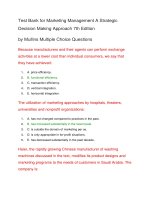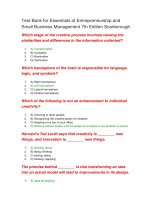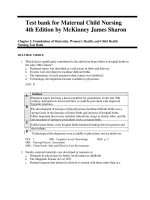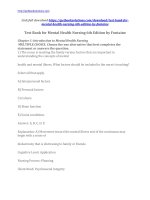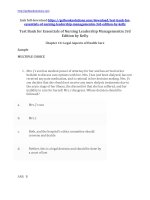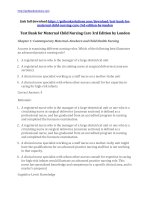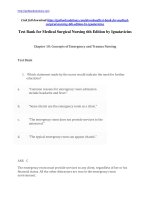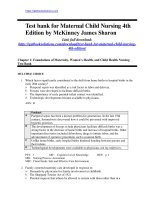Test bank for medical surgical nursing patient centered collaborative care 7th edition ignatavicius
Bạn đang xem bản rút gọn của tài liệu. Xem và tải ngay bản đầy đủ của tài liệu tại đây (60.97 KB, 9 trang )
buy this full document at
Ignatavicius: Medical-Surgical Nursing, 7th Edition
Chapter 1: Introduction to Medical-Surgical Nursing
Test Bank
MULTIPLE CHOICE
1. Which action demonstrates that the nurse understands the purpose of the Rapid
Response Team?
a. Monitoring the client for changes in postoperative status such as wound infection
b. Documenting all changes observed in the client and maintaining a postoperative
flow sheet
c. Notifying the physician of the client’s change in blood pressure from 140 to 88
mm Hg systolic
d. Notifying the physician of the client’s increase in restlessness after medication
change
ANS: C
The Rapid Response Team (RRT) saves lives and decreases the risk for harm by
providing care to clients before a respiratory or cardiac arrest occurs. Although the RRT
does not replace the Code Team, which responds to client arrests, it intervenes rapidly for
those who are beginning to decline clinically. It would be appropriate for the RRT to
intervene when the client has experienced a 52-point drop in blood pressure. Monitoring
the client’s postoperative status, maintaining a postoperative flow sheet, and notifying the
physician of a change in the client’s status after a medication change would not be
considered activities of the Rapid Response Team.
DIF: Cognitive Level: Comprehension/Understanding
REF: pp. 2-3
TOP: Client Needs Category: Safe and Effective Care Environment (Management of
Care—Collaboration with Interdisciplinary Team)
MSC: Integrated Process: Nursing Process (Assessment)
2. The Joint Commission focuses on safety in health care. Which action by the nurse
reflects The Joint Commission’s main objective?
a. Performing range-of-motion exercises on the client three times each day
b. Ensuring that the client is eating 100% of the meals served to him or her
c. Assessing the client’s respirations when administering opioids
d. Delegating to the nursing assistant to give the client a complete bath daily
ANS: C
It is important for the nurse to assess respirations of the client when administering opioids
because of the possibility of respiratory depression. The other interventions may or may
not be necessary in the care of the client and do not focus on safety.
DIF: Cognitive Level: Application/Applying or higher
REF: N/A
buy this full document at
Test Bank
1-2
TOP: Client Needs Category: Safe and Effective Care Environment (Safety and Infection
Control)
MSC: Integrated Process: Nursing Process (Assessment)
3. Which action by the nurse shows an understanding of the principle of selfdetermination?
a. Allowing a postoperative client to decide to take medication with fruit juice rather
than water
b. Allowing a teenager to decide not to go to a clinic when there is evidence that she
is having profuse vaginal bleeding
c. Allowing a parent to decide not to proceed with a lifesaving operation for a 12year-old client
d. Allowing an older client with dementia to decide not to take cardiac medication
throughout the shift
ANS: A
Respect for people is one of three basic ethical principles that nurses and other health
care professionals should use as a basis for clinical decision making. Respect implies that
clients are treated as autonomous individuals capable of making informed decisions about
their care. This client autonomy is referred to as self-determination, or self-management,
and is best illustrated by allowing a client to decide to take medication with fruit juice
rather than water. The other answer choices would not illustrate self-determination
appropriately and might possibly endanger the client’s life.
DIF: Cognitive Level: Application/Applying or higher
REF: N/A
TOP: Client Needs Category: Safe and Effective Care Environment (Management of
Care—Ethical Practice) MSC:
Integrated Process: Nursing Process
(Assessment)
4. The nurse is initiating a series of teaching sessions with an older client. What is the
nurse’s highest-priority, client-centered action before beginning the session?
a. Ensure that the client’s family is present and will participate.
b. Make certain that the client is wearing his glasses.
c. Have printed handouts ready to use during the session.
d. Schedule the session for early evening after the client’s meal.
ANS: B
The most important client-centered action is to ensure that the client is wearing his or her
glasses. The ability to see adequately will outweigh the need for family presence, use of
printed handouts, and hunger (or lack thereof).
DIF: Cognitive Level: Application/Applying or higher
REF: N/A
TOP: Client Needs Category: Health Promotion and Maintenance (Principles of
Teaching/Learning)
MSC: Integrated Process: Teaching/Learning
Copyright © 2013, 2010, 2006, 2002 Saunders, an imprint of Elsevier Inc. All rights reserved.
Test Bank
1-3
5. Which action best demonstrates the nurse using client-centered care when planning a
menu for a Vietnamese client who is newly diagnosed with diabetes?
a. Asking the client what food he or she would eat on a standard diabetic menu
b. Asking family members to make selections for the client from a diabetic menu
c. Ordering a typical diabetic meal for the client and planning diet teaching
d. Researching the Vietnamese culture before discussing diabetic meal planning
ANS: D
Client-centered care is best illustrated by the nurse researching Vietnamese culture and
native cooking before discussing meal planning. This shows that the nurse is interested
and is involved in the client’s care. The nurse can then suggest foods from the standard
diabetic menu to the client and his or her family.
DIF: Cognitive Level: Application/Applying or higher
REF: N/A
TOP: Client Needs Category: Physiological Integrity (Basic Care and Comfort—
Nutrition and Oral Hydration)
MSC: Integrated Process: Teaching/Learning
6. The Institute for Healthcare Improvement (IHI) identified interventions to save client
lives. Which actions are within the scope of nursing practice to improve quality of care?
a. Insert a central line to give intravenous fluid to a dehydrated client.
b. Use sterile technique when changing dressings on a new surgical site.
c. Intubate a client whose oxygen saturation is 92%.
d. Prescribe aspirin for a client who presents with an acute myocardial infarction
ANS: B
The only intervention identified within the scope of nursing practice is to use sterile
technique. Central line insertion, intubation, and prescription are functions of the
physician.
DIF: Cognitive Level: Application/Applying or higher
REF: N/A
TOP: Client Needs Category: Safe and Effective Care Environment (Management of
Care—Legal Rights and Responsibilities)
MSC: Integrated Process: Nursing Process (Implementation)
7. Which action by the nurse demonstrates the best practice for nursing documentation
on a computerized record?
a. Deleting all documentation errors on the computerized record
b. Using red font to denote all significant events that have occurred
c. Waiting until the end of the shift to record a summary of information
d. Documenting assessment data at the point of care
ANS: D
The best practice for nursing documentation is to document as soon as the assessment is
completed. The other practices listed are ineffective and are not recommended.
DIF: Cognitive Level: Application/Applying or higher
REF: N/A
Copyright © 2013, 2010, 2006, 2002 Saunders, an imprint of Elsevier Inc. All rights reserved.
Test Bank
1-4
TOP: Client Needs Category: Safe and Effective Care Environment (Management of
Care—Legal Rights and Responsibilities)
MSC: Integrated Process: Communication and Documentation
8. A client is scheduled for a mastectomy. As she is about to receive the preoperative
medication, she tells the nurse that she does not want to have her breast removed but
wants a lumpectomy. Which response indicates that the nurse is acting as a client
advocate?
a. Telling the client her surgeon is excellent and knows what is best for her condition
b. Calling the surgeon to come and explain all treatment options to the client
c. Holding the client’s hand and offering to pray with her for a good outcome
d. Arranging for a postoperative visit from a cancer survivor
ANS: B
Clients have the right to be fully informed about their treatment plans and to change their
minds. A client who expresses doubt, uncertainty, or a change of feeling about a treatment
plan should be supported by the nurse and heard by the health care provider, and should
serve as an active participant in treatment planning. The nurse would be functioning best
as a client advocate by notifying the surgeon that the client wants a different treatment
option. The nurse would not be acting as a client advocate by providing vague
reassurance, arranging for a cancer survivor to come meet with the client, or offering to
pray with the client because none of these options would address the client’s desire for a
different treatment option. Calling the surgeon to come and explain all treatment options
also promotes communication and client advocacy.
DIF: Cognitive Level: Application/Applying or higher
REF: N/A
TOP: Client Needs Category: Safe and Effective Care Environment (Management of
Care—Ethical Practice) MSC:
Integrated Process: Caring
9. What priority assessment data should be shared with the interdisciplinary team from a
client admitted to the emergency department with a lacerated artery?
a. Information regarding next of kin to notify in case the client dies
b. History about what medications the client is currently taking
c. Measurement of blood pressure and pulse
d. Assessment of rate and depth of respirations
ANS: C
In establishing an emergency database, assessment first focuses on the immediate
problem, especially with a high probability for a life-threatening consequence. Assessing
vital signs such as blood pressure and pulse, which indicate the client’s hemodynamic
status, is the priority intervention. Determining the client’s current medications, notifying
next of kin, or measuring the rate and depth of respirations is of less importance at this
time.
DIF: Cognitive Level: Application/Applying or higher
REF: N/A
TOP: Client Needs Category: Physiological Integrity (Physiological Adaptation—
Copyright © 2013, 2010, 2006, 2002 Saunders, an imprint of Elsevier Inc. All rights reserved.
Test Bank
Medical Emergencies)
(Assessment)
1-5
MSC:
Integrated Process: Nursing Process
10. Which intervention can the client expect to receive from a medical-surgical nurse in
an ambulatory care setting?
a. Drawing blood for routine or preoperative testing
b. Teaching the client how to change a dressing on an incision
c. Obtaining the client’s signature on a surgical consent form
d. Performing a comprehensive physical examination
ANS: B
Client teaching is a primary role of the medical-surgical nurse. Obtaining a surgical
consent is usually the responsibility of the person performing the surgery. Blood drawing
and performing physicals may be done by the nurse but are not primary nursing
responsibilities.
DIF: Cognitive Level: Application/Applying or higher
REF: N/A
TOP: Client Needs Category: Safe and Effective Care Environment (Management of
Care—Continuity of Care)
MSC: Integrated Process: Nursing Process
(Planning)
11. An emergency department (ED) nurse gives report on a client who is being
transferred to the medical-surgical floor. Because of an identified risk for suicide, the ED
nurse suggests that the floor nurse contact a sitter and behavioral health. This statement
represents which part of the SBAR hand-off?
a. Situation
b. Background
c. Assessment
d. Recommendation
ANS: D
The ED nurse is giving recommendations to the medical-surgical floor nurse about
interventions to start for the client who is being transferred. No communication is
provided in the SBAR report about the situation, background, or assessment.
DIF: Cognitive Level: Knowledge/Remembering
REF: p. 4
TOP: Client Needs Category: Safe and Effective Care Environment (Management of
Care—Continuity of Care)
MSC: Integrated Process: Communication and Documentation
12. The nurse is present when the physician discusses the potential effects of a
chemotherapy regimen for a client with cancer. Weighing the benefits of the
chemotherapy against possible side effects is an example of which ethical principle?
a. Paternalism
b. Beneficence
c. Justice
Copyright © 2013, 2010, 2006, 2002 Saunders, an imprint of Elsevier Inc. All rights reserved.
Test Bank
1-6
d. Autonomy
ANS: B
Beneficence stresses the importance of preventing harm and promoting the client’s wellbeing. When benefits versus negative effects of an intervention are compared, the client is
better informed and can evaluate what could be done in his or her best interest. Autonomy
implies self-determination, justice refers to equality, and paternalism refers to the male
head of the family for decision making.
DIF: Cognitive Level: Comprehension/Understanding
REF: p. 4
TOP: Client Needs Category: Safe and Effective Care Environment (Management of
Care—Ethical Practice) MSC:
Integrated Process: Caring
13. The physician prescribes warfarin (Coumadin) 15 mg daily. The nurse notes that this
is three times the normal dose for this client based on the client’s medication profile and
laboratory work. What does the nurse do first?
a. Give the dose and document the concern.
b. Call the pharmacy for a consultation.
c. Call the physician to question the order.
d. Hold the medication for that day.
ANS: C
Communication between the physician and the nurse should be the first step in
medication administration to ensure safety in client care. The pharmacy can be consulted
but not as the first step. The other answers are not safe practices for the nurse.
DIF: Cognitive Level: Application/Applying or higher
REF: N/A
TOP: Client Needs Category: Safe and Effective Care Environment (Safety and Infection
Control—Error Prevention)
MSC: Integrated Process: Communication and Documentation; Nursing Process
(Evaluation)
14. Which statement best describes the process of nursing case management?
a. The coordination of care services to at-risk populations
b. A collaborative process to promote quality and cost-effective care
c. The implementation of care to acutely ill, underserved populations
d. A cost-effective care delivery model meeting the needs of specially defined groups
ANS: B
The process of case management involves collaboration to assess, plan, implement,
coordinate, monitor, and evaluate services to meet health care needs in a manner that
promotes quality and cost-effective outcomes. It does not solely involve coordination of
care services to at-risk populations, implementation of care to acutely ill and underserved
clientele, nor a cost-effective model of care delivery that will meet the needs of specially
defined groups.
Copyright © 2013, 2010, 2006, 2002 Saunders, an imprint of Elsevier Inc. All rights reserved.
Test Bank
1-7
DIF: Cognitive Level: Comprehension/Understanding
REF: p. 4
TOP: Client Needs Category: Safe and Effective Care Environment (Management of
Care—Continuity of Care)
MSC: Integrated Process: Nursing Process
(Planning)
15. Which client is best served by a case manager?
a. An older woman with chronic cystitis
b. A middle-aged man with moderate hypertension
c. An older woman with chronic heart failure and diabetes mellitus
d. A young adult with a fractured ankle from a sports injury
ANS: C
The case management process is reserved for clients who have complex health problems
(high risk) and incur a high cost to the health care system. Clients with chronic cystitis,
moderate hypertension, or a fractured ankle probably would not incur high costs to the
health care system.
DIF: Cognitive Level: Comprehension/Understanding
REF: p. 4
TOP: Client Needs Category: Safe and Effective Care Environment (Management of
Care—Continuity of Care)
MSC: Integrated Process: Nursing Process
(Planning)
16. The client with a stroke was admitted to a medical-surgical unit. Which tasks does the
nurse delegate to the unlicensed assistive personnel?
a. Complete the nursing care plan.
b. Assist the client with meals.
c. Evaluate the pulse oximetry reading.
d. Assess level of consciousness.
ANS: B
The nurse needs to know the five rights of delegation: right task, right circumstances,
right person, right communication, and right supervision. Unlicensed assistive personnel
can help with feeding, but only the nurse can care plan, assess the level of consciousness,
and evaluate the oxygenation of the client.
DIF: Cognitive Level: Application/Applying or higher
REF: N/A
TOP: Client Needs Category: Safe and Effective Care Environment (Management of
Care—Delegation) MSC: Integrated Process: Communication and Documentation
MULTIPLE RESPONSE
1. The nurse on a medical-surgical unit notices that there has been an increase in the
number of client falls. Which methods would be effective in promoting quality
improvement on this issue? (Select all that apply.)
a. Identify causes of falls on the unit by looking at specific client cases.
b. Look at the research and the literature on prevention of falls.
Copyright © 2013, 2010, 2006, 2002 Saunders, an imprint of Elsevier Inc. All rights reserved.
Test Bank
1-8
c. Complain to the manager that team members are neglecting the clients.
d. Use sit and stand alarms because they seem to be working on other units.
e. Try more frequent rounding on clients as suggested by co-workers.
ANS: A, B, D, E
Quality improvement requires individual and systematic evaluation. Evidence-based
practice in the form of research and literature can aid in revision of care processes. After
review of ways that falls can be prevented, specific recommendations can be made to
improve care on the unit. Complaining does not facilitate the resolution of a problem.
DIF: Cognitive Level: Application/Applying or higher
REF: N/A
TOP: Client Needs Category: Safe and Effective Care Environment (Safety and Infection
Control—Accident/Injury Prevention)
MSC: Integrated Process: Nursing Process (Planning, Evaluation)
2. Which settings would require maximum implementation of the nurse supervisor role?
(Select all that apply.)
a. Acute care setting
b. Home care setting
c. Skilled nursing facility
d. Assisted-living facility
e. Rehabilitation facility
ANS: A, B, C, D, E
In all of the listed facilities and settings, numerous unlicensed assistive personnel are
delegated various tasks. The registered nurse is responsible for overseeing the actions of
such personnel and therefore would implement the supervisor role to its maximal extent.
DIF: Cognitive Level: Comprehension/Understanding
REF: p. 5
TOP: Client Needs Category: Safe and Effective Care Environment (Management of
Care—Concepts of Management)
MSC: Integrated Process: Nursing Process
(Planning)
3.
a.
b.
c.
d.
e.
f.
Which activities are within the role of the case manager? (Select all that apply.)
Gathering and organizing data about a client from client records and interviews
Planning care for a client with emphasis on client satisfaction
Coordinating care among a variety of health care professionals and settings
Promoting the client’s interests while negotiating necessary health care
Advocating for the client and the family throughout the continuum of care
Using resources for appropriate client health care services
ANS: A, C, D, E, F
Primary roles of the nursing case manager include wide-reaching assessment, planning
for timely and cost-effective outcomes, facilitation, and advocacy. Roles of the nursing
case manager do not include planning care for a client with emphasis on client
satisfaction.
Copyright © 2013, 2010, 2006, 2002 Saunders, an imprint of Elsevier Inc. All rights reserved.
Test Bank
1-9
DIF: Cognitive Level: Comprehension/Understanding
REF: p. 4
TOP: Client Needs Category: Safe and Effective Care Environment (Management of
Care—Concepts of Management)
MSC: Integrated Process: Nursing Process
(Planning)
4. A client has metastatic lung cancer and is hospitalized for chemotherapy. Which
intervention does the nurse delegate to the unlicensed assistive personnel? (Select all that
apply.)
a. Assist the client with repositioning.
b. Teach the client to use the incentive spirometer.
c. Take vital signs every 4 hours.
d. Record intake and output measurements.
e. Promote the expression of grief and loss.
ANS: A, C, D
UAP can perform vital signs, record intake and output measurements, and aid in turning
and positioning. Teaching and promoting client expression of feelings related to the
grieving process are within the role of the nurse.
DIF: Cognitive Level: Application/Applying or higher
REF: N/A
TOP: Client Needs Category: Safe and Effective Care Environment (Management of
Care—Delegation) MSC: Integrated Process: Communication and Documentation
Copyright © 2013, 2010, 2006, 2002 Saunders, an imprint of Elsevier Inc. All rights reserved.
